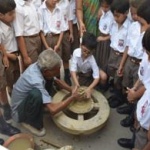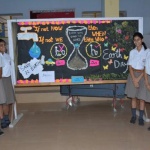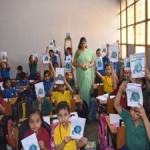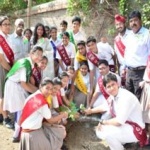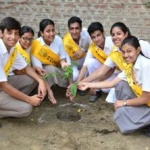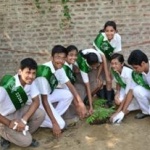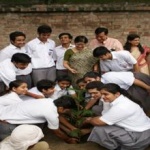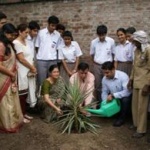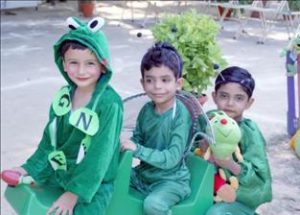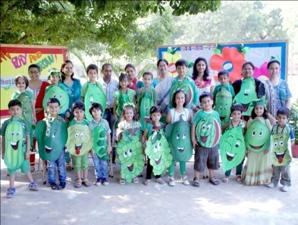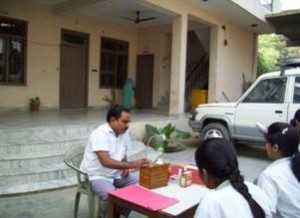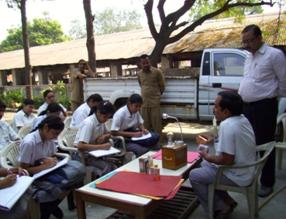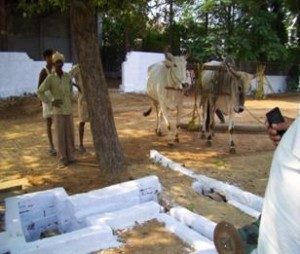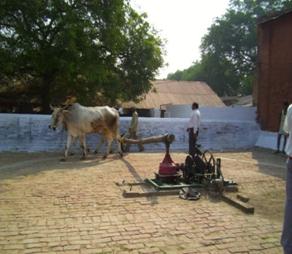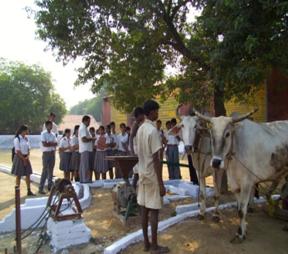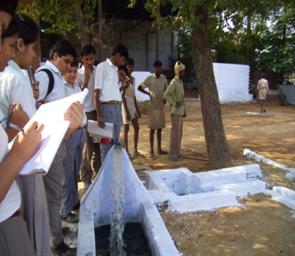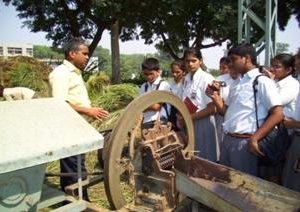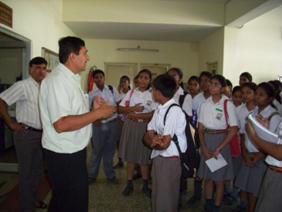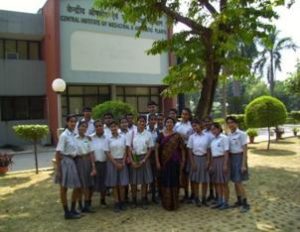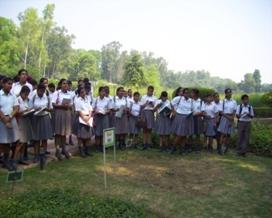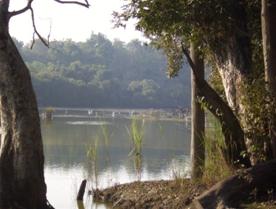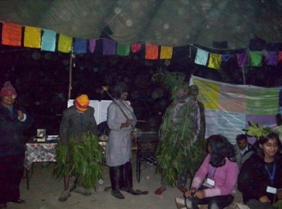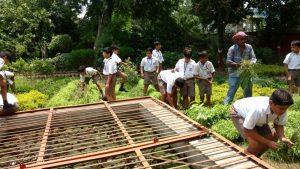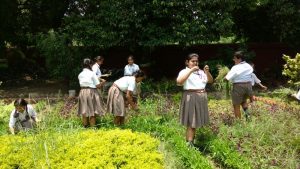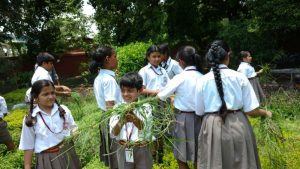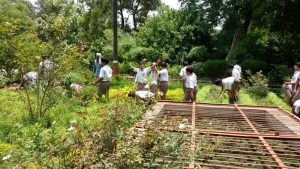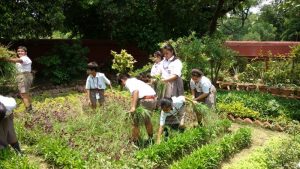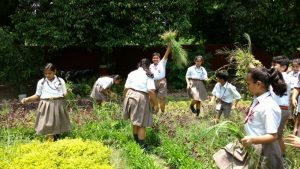Infrastructure Eco Zone
Infrastructure Eco Zone
Best school admission in Kanpur
Jaipurians always believe in the above as environment security is a major global problem of today. We aim at a clean and healthy school campus as well as its surroundings. Issues are mainly related to the climatic changes, ozone layer depletion, global warming, heavy precipitation at some places, much lower in other places, alarming low ground water level, increased contamination and toxicity of groundwater. One of the root causes is reduction in forest cover.
Keeping all these in mind the school makes a constant endeavor to motivate the students towards environment conservation. Some of the efforts made by school and students are:
 Teachers and students bring their study material etc. in jute/cloth bag. Even our stationery book shop strictly follows it. Parents are requested to bring jute bags to carry their book sets.
Teachers and students bring their study material etc. in jute/cloth bag. Even our stationery book shop strictly follows it. Parents are requested to bring jute bags to carry their book sets.
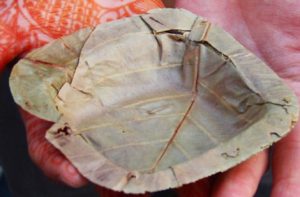 Snacks are served in bowls made of dry leaves.
Snacks are served in bowls made of dry leaves.
 Paper waste of school in bulk is sent for recycling.
Paper waste of school in bulk is sent for recycling.
 Handmade recycled papers are preferred.
Handmade recycled papers are preferred.
 CNG buses and CNG vans for eco-friendly transportation.
CNG buses and CNG vans for eco-friendly transportation.
 Closing taps after use
Closing taps after use
Biodegradable waste is separated and in vermicompost pit organic fertilizer is formed.


 Weekly two periods are allotted for environmental science activity –NATURE CLUB in which discussions of the recent natural calamities covering various aspects e.g. causes, long term effects of deforestation, floods in Assam, avalanches etc. are made.
Weekly two periods are allotted for environmental science activity –NATURE CLUB in which discussions of the recent natural calamities covering various aspects e.g. causes, long term effects of deforestation, floods in Assam, avalanches etc. are made.
Students make message depicting, nice, beautiful models and charts on burning topics such as global warming, recycling, waste treatment, landfills.
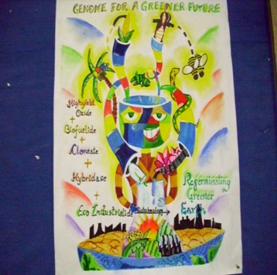
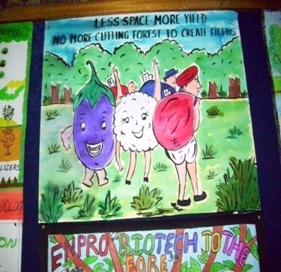
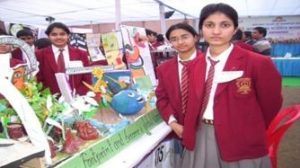 beautiful model made by the students.
beautiful model made by the students.
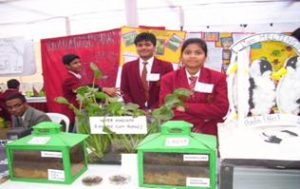 Eco-friendly use of water menace- water hyacinth.
Eco-friendly use of water menace- water hyacinth.
As soon as you enter in the school, on your right you will find a huge neem tree and a row of Ashoka trees on your left. On reaching close to these you will find a name plate on the tree trunk making you familiar with the common, biological name, family and medicinal value of the plant. Is it not interesting? Each variety of plant is thus introduced to you, this all is the effort made by the school to create awareness in the students and visitors, so that they start conserving plants because of their direct/indirect role in human life.
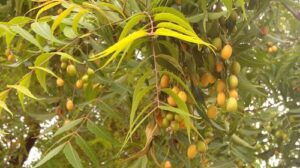
1. Earth Day Celebration:
Each year on 6th April school celebrates Earth Day where students present their environmental concerns in form of Collage Making Contest. This year we had Captain Tiwari – the leader of Kanpur Parivartan Forum working for Swachh Bharat Mission-Clean Kanpur, Green Kanpur, as our Chief Guest. His Motivational Talk on cleanliness for a Sustainable Earth stimulated students to think deeply about the future ecological concepts. They promised to change their day to day habits to contribute towards keeping their surroundings clean without plastics and use of eco-friendly, biodegradable, recyclable articles. Dr. Tiwari and his team judged the eye catching collages.
Not only in Seniors we try to inculcate these habits in Primary students also. On the Earth Day all these small kids got an opportunity to see the Earthen Pot making activity. We called a potter to give a live demo. Children actively participated in it and loved it a lot. They were encouraged to avoid using plastic mugs and go for earthen pots such as kulhad.
The kids of classes 1 and 2 also played a skit on Save Trees. A beautiful Poem Recitation on the concerned topic was appreciated by one and all. All the students of classes 4 and 5 planted small saplings of Portulaca plant.
2. Tree Plantation:
Each year 4-5 times large number of saplings are planted in the school campus. One of the major occasion is “Varsha Mangal Utsav” held in August (rainy season) to welcome rains to maintain green roof of Earth. Usually the plants selected for plantation are of great significance in the medicinal field and have great economic value. We have huge trees like Arjun, Sal, Sindoor, Tamarind, Amla, Thuja, Neem, Peepal, Banyan and large number of herbs and shrubs.
An initiative by the school to plant more and more trees on Varsha Mangal Utsav.
3. Green Day:
Medicinal plants: Our school nursery has special mention of plants of great medicinal values- Sarpagandha, Ashwagandha, Dumbel, Kapoor Tulsi, Sadabahar, Shatawar, Brahmi, Ajawain, Turmeric etc.
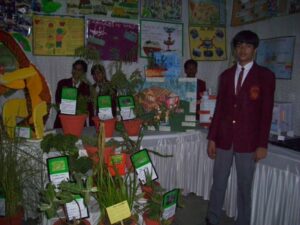
THE PROJECT-DHANVANTARI VAATIKA: In the year 2017 with a lot of efforts and in collaboration with Central Institute of Medicinal and Aromatic Plants, Lucknow and Forest Research Institute, Kanpur wewere able to shape up a beautiful and informative herbal and medicinal garden in the campus where we have planted about 30 species of medicinal plants which play a great role in keeping us healthy without side effects. Each [plant has a proper sign board mentioning its common, Biological name along with the medicinal importance. This creates awareness in students and parents for conserving the exclusive varieties few of which are losing their existence due to ignorance.
Sustainability of our planet Mother Earth is in terrible distress. This is on account of excessive anthropogenic onslaught: over population, industrialization, pollution, non-biodegradable waste, climate change and deforestation. In the present age of malls and motor cars, people have detached themselves from environmental concerns. With our umbilical cord with Mother Earth cut asunder, we are like orphans deprived of maternal warmth. To do and understand something concrete and practical we are not leaving any aspect untouched to ignite the young minds towards this delicate issue. Hence we are arranging short one day and little longer 3-4 days camps for students to various eco rich areas. It is an effort to feel the beauty of Earth, her Majesty and Power and most importantly to realize how human rapacity and greed have devastated her. To awaken sensitivity in their heart each year we take the students to explore Dudhwa National Park. The eerie jungles, spooky swamps and vast carpets of grasslands have a magical effect on students.
We are also having one day Nature Camp beneath a Giant 350 years old Banyan Tree surrounded by Mango Orchards. One is awestuck by its size and spread. It is a live example of sheer artistry and sublimity of nature. We make it a point that these sites are attended by 100% students.
Our small steps have provoked the children to ACT GREEN.
Lab Visits: Time-to-time students are taken for educational trips to various research labs where they get much information about nature’s greatest treasure of plant and animal life.
Students learnt the uses of distilled cow urine for:
- Cottage industries
- Electricity Generation
- Mobile recharger
- Preparation of herbal cosmetics
And of cow dung for:
- Cottage industries
- Electricity Generation
- Mobile recharger
- Preparation of herbal cosmetics.
We are improving our Filtration System and as an offshoot we are planning to introduce Rainwater Harvesting System.
26th Asian Association Of Biology Education.
To show a deep concern on wastage of food because of whichburning environmental issues develop such as emission of Green House Gases and scarcity of food for a major population, leftover food and the health risk, one of our faculty Dr. Anupma Srivastava H.O.D. Biology presented a research paper aiming to generate the awareness in students at school level in the above said Conference held at International Center of Goa from 20th -24th September, 2016.Our school got a Global recognition in the Conference as Mrs. Srivastava was the Member of the Advisory Committee.






